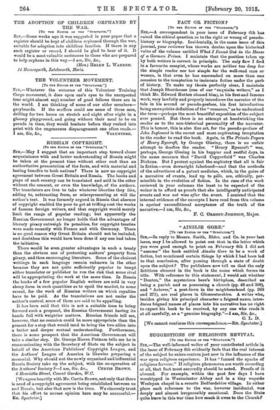RUSSIAN COPYRIGHT. (To 555 Roma or 551...8555555os.-1 SIR,—May I suggest
that an important step toward closer acquaintance with and better understanding of Russia might be taken at the present time without other cost than an authoritative presentation of the facts, and with material and ]acting benefits to both national' There is now no copyright agreement between Great Britain and Russia. The books and plays of each country can be translated and sold in the other without the consent, or even the knowledge, of the authors. The translators are free to take whatever liberties they like, adding to, subtracting from, or misrepresenting at will the author's text. It was formerly argued in Russia that absence of copyright enabled, the poor to get at trifling coat the works of famous foreign writers, and that copyright would merely limit the range of popular reading ; but apparently the Russian Government no longer holds that the advantages of literary piracy outweigh its penalties, for copyright treaties were made recently with France and with Germany. There is no good reason why Great Britain should not be included, and doubtless this would have been done if any one had taken the initiative.
There would be even greater advantages in such a treaty than the obvious one of protecting authors' property from piracy, and thus encouraging literature. Some of the choicest writings in each language remain unknown in the other because they are not quite sufficiently popular to tempt either translator or publisher to ran the risk that some rival will be appropriating the work at the some time. In Russia the books of a few popular English writers are sold in very cheap form in such quantities as to spoil the market, to some extent, for the work of Russian writers on which royalties have to be paid. As the translations are not ender the author's control, some of them are said to be appalling.
It has been said that this is not a suitable time to bring forward such a proposal, the Russian Government having its hands full with weightier matters. Russian friends tell me„ however, that no occasion could be more appropriate than the present for a step that would tend to bring the two allies into a better and deeper mutual understanding. Furthermore, there is some prospect that the American Government will take a similar step. Dr. George Haven Putnam tells me he is communicating with the Secretary of State on the subject is behalf of the American Publishers' Copyright League, and the Authors' League of America is likewise preparing a memorial. Why should not the newly organized and influential Russia Society take up the subject, with the co-operation of [We agree heartily with Mr. Curtis Brovrn,not only that there is need of a copyright agreement being established between us and Russia, but also that now is the time. We sincerely trust that his effort to arouse opinion here may be successful,— ED. Spectator.1






































 Previous page
Previous page